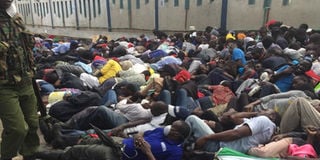Let us safeguard human dignity even when fighting coronavirus

Police victimise Mombasa residents at Likoni ferry channel hours before start of nationwide curfew to curb spread of coronavirus, on March 27, 2020. PHOTO | FILE | NATION MEDIA GROUP
What you need to know:
- The police brutality that left at least six people dead during the first 10 days of the dusk-to-dawn curfew is simply unacceptable.
- Condescending attitudes towards the less fortunate by the high and mighty erode the social fabric, creating social divisions.
Dignity is a birthright.
All human beings come with their own worth; that is why it is vital to recognise and safeguard the dignity of all human beings, especially the weaker ones. It is unacceptable to treat them as instruments for furthering selfish interests.
Affirming the dignity of others has nothing to do with their qualities or accomplishments, which also means their dignity cannot be taken away. But it can — and often is — compromised, violated and undermined.
Longing for dignity remains a basic feeling in all of us. And when our dignity is trampled upon, the basic instinct is to re-assert and reclaim it.
That is what the African people have done in their struggles against slavery, colonialism, neocolonialism, apartheid and other forms of racism.
At his trial in 1964, Nelson Mandela told the judge he cherished the ideal of living “in dignity and freedom”, an ideal he hoped to live and to achieve, “but if need be, my Lord, it is an ideal for which I am prepared to die”.
Those words of Mandela, the icon of modern struggles for freedom, peace and human rights, best capture the power of dignity and courage.
The freedom fighters who liberated Kenya from the yoke of British colonialism would identify with Mandela’s aspirations.
POLICE BRUTALITY
They were prepared to lay down their lives for the sake of freedom, justice and prosperity. In a word, to reclaim their — and all Kenyans’ — dignity. And they were so committed to that ideal that many paid the ultimate price.
The champions of the ‘Second Liberation’ picked up that mantle in the 1970s and ’80s, when the one-party dictatorship trampled upon Kenyans’ dignity.
Human dignity is violated and undermined not only by human beings and their unjust structures and systems, social phenomena, such as the coronavirus, too, and poverty.
But it is not these phenomena that are morally repugnant but rather the abhorrent treatment ordinary people are subjected to by the authorities.
What happened on the first evening of the curfew, on March 27, will for a long time remain a defining moment in the handling of the Covid-19 pandemic in Kenya.
The police brutality that left at least six people dead during the first 10 days of the dusk-to-dawn curfew is simply unacceptable.
Scenes in Mombasa showing the kicking and clubbing of women and men who were already lying on the ground is more the behaviour of sadists than trained security personnel entrusted with authority over the people.
We saw similar behaviour on Thika Superhighway, where a police officer continued clubbing a driver who had surrendered.
UNITY OF PURPOSE
But on the same night we also witnessed a policewoman carrying the bag of a mother who had a baby as she escorted them home. That was a rare deed deserving of an award.
Covid-19 has presented us with a rare opportunity to invoke the much-talked about (but little-practised) unity of purpose. Kenyans of all walks of life ought to come together in respecting the safety guidelines.
Social cohesion is an imperative if we are to triumph over Covid-19. Mutual trust, respect, caring, empathy, honesty and commitment are key elements that hold a society together.
But condescending attitudes towards the less fortunate by the high and mighty erode the social fabric, creating social divisions.
When the lowly are subjected to assault by the police or talked down to by state officers, mutual trust is undermined and dignity violated. Socioeconomic division in the common struggle is the last thing Kenya needs.
BROTHER'S KEEPER
We need what President Uhuru Kenyatta said in his 2016 Jamhuri Day speech: “Our fathers and mothers faced an empire that could import soldiers by the thousands and guns by the tonne. And yet because our fathers and mothers were united, not even the might of this empire could keep them in bondage.”
“We know all too well what happened the last time we failed to treat each other as one family ... Come, and let us be our brother’s keeper.”
That is what safeguarding the dignity of all means when a people are at war — with a pandemic is no respecter of class, gender, race or ethnicity.
Rev Kobia is the chairman, National Cohesion and Integration Commission (NCIC). [email protected].




